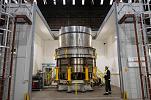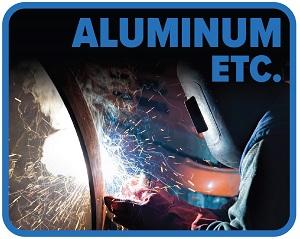Industrial Systems and Manufacturing Instructor
- FMA
- The Fabricator
- FABTECH
- Canadian Metalworking
Categories
- Additive Manufacturing
- Aluminum Welding
- Arc Welding
- Assembly and Joining
- Automation and Robotics
- Bending and Forming
- Consumables
- Cutting and Weld Prep
- Electric Vehicles
- En Español
- Finishing
- Hydroforming
- Laser Cutting
- Laser Welding
- Machining
- Manufacturing Software
- Materials Handling
- Metals/Materials
- Oxyfuel Cutting
- Plasma Cutting
- Power Tools
- Punching and Other Holemaking
- Roll Forming
- Safety
- Sawing
- Shearing
- Shop Management
- Testing and Measuring
- Tube and Pipe Fabrication
- Tube and Pipe Production
- Waterjet Cutting
Industry Directory
Webcasts
Podcasts
FAB 40
Advertise
Subscribe
Account Login
Search
Aluminum Etc.: The benefits of aluminum welding
Why aluminum, compared to steel, might be the most cost-effective material for welders
- By Gina Cutts
- Updated August 7, 2023
- August 13, 2022
- Article
- Aluminum Welding
There has been tremendous growth in aluminum production and manufacturing. These developments, paired with technological innovations, have many companies rethinking their products made from steel.
From construction, automotive, and aerospace to aluminum cans and electrical conductors, manufacturing advancements have made a fabricator’s choice of phasing out steel for aluminum easier and more cost effective than ever before. And if you factor in consumers demanding more transparency from their suppliers regarding their sourcing and sustainability efforts, aluminum’s benefits outperform steel in almost every category.
Sure, steel costs less than aluminum currently. But if you take into consideration application costs, aluminum might be the most cost-effective material without sacrificing quality. And consider that aluminum is 100% recyclable and retains its properties indefinitely, making it one of the only materials that more than pays for its own collection.
Considering Aluminum Welding?
Here are a few things to consider if you are thinking of making the switch to aluminum:
- Aluminum does not rust easily, so there is no need to provide a coating (such as paint) to resist corrosion.
- Aluminum is much more malleable than steel, which tends to get rigid and crack if overworked.
- You can work and shape aluminum into just about anything a designer can think up.
Weight is a huge factor many will consider, as aluminum is about one-third the weight of steel. Switching to aluminum can save a lot of money on building, transportation, and packaging costs. If we can reduce the weight of our products by one-third, we can address global fuel-efficiency concerns. Lighter planes, boats, and vehicles will cut our fuel consumption by an estimated 60% or more. How can you justify not switching to aluminum?
Keep in mind, this is not in any way a full, comprehensive list of how using aluminum vs. steel can benefit a company and consumers. There are so many more positive factors out there for you to go further down the rabbit hole. But even the few examples I have listed should give you pause and hopefully get you thinking about aluminum differently.
About the Author

About the Publication
subscribe now

The Welder, formerly known as Practical Welding Today, is a showcase of the real people who make the products we use and work with every day. This magazine has served the welding community in North America well for more than 20 years.
start your free subscription- Stay connected from anywhere

Easily access valuable industry resources now with full access to the digital edition of The Fabricator.

Easily access valuable industry resources now with full access to the digital edition of The Welder.

Easily access valuable industry resources now with full access to the digital edition of The Tube and Pipe Journal.
- Podcasting
- Podcast:
- The Fabricator Podcast
- Published:
- 04/16/2024
- Running Time:
- 63:29
In this episode of The Fabricator Podcast, Caleb Chamberlain, co-founder and CEO of OSH Cut, discusses his company’s...
- Trending Articles
Sheffield Forgemasters makes global leap in welding technology

ESAB unveils Texas facility renovation

Engine-driven welding machines include integrated air compressors

How welders can stay safe during grinding

The impact of sine and square waves in aluminum AC welding, Part I

- Industry Events
16th Annual Safety Conference
- April 30 - May 1, 2024
- Elgin,
Pipe and Tube Conference
- May 21 - 22, 2024
- Omaha, NE
World-Class Roll Forming Workshop
- June 5 - 6, 2024
- Louisville, KY
Advanced Laser Application Workshop
- June 25 - 27, 2024
- Novi, MI



























